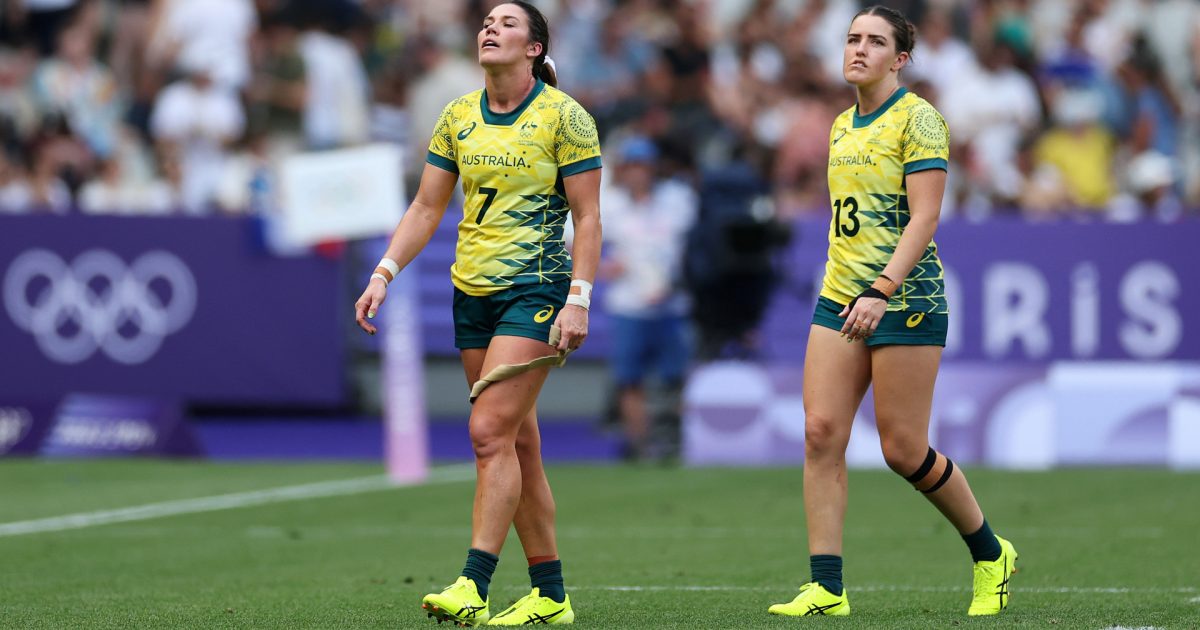Charlotte Caslick reflects on Australia’s ‘devastating’ Olympics heartbreak

For Australia, an Olympic medal was right there for the taking in Paris until it wasn’t. The SVNS Series champions missed out on the chance to challenge for gold, and while they led deep into their bronze medal clash with the USA, one costly moment changed everything.
Ilona Maher had just carried the ball into contact but the Women’s Sevens Eagles were still parked well inside their own 22. Australia had taken the lead late with a try to Teagan Levi, but the match was still alive, and that’s all that mattered for the underdogs.
The USA needed a heroine and it was Alex Sedrick who stood tall and answered the call. ‘Spiff’ Sedrick got the ball five metres out from her own try line, but after beating tackle attempts from Sharni Smale, Teagan Levi and Tia Hinds, the American was off to the races.
Maddison Levi chased desperately, but it wasn’t to be for Australia.
Spiff converted her own try to win the bronze medal playoff 14-12 for the USA. That was the first time the USA had won a rugby sevens medal at an Olympic Games. With Ilona Maher leading the way on social media, that bronze has inspired many to chase their own dreams.
As for Australia, their sevens medal drought at the Games will carry through to at least Los Angeles in four years’ time. Team Australia were knocked out in the quarter-finals at the postponed Tokyo Games – an Olympic campaign that Charlotte Caslick was also part of.
Caslick, who won gold with Team Australia at the 2016 Rio Games, has opened up on the pain, heartbreak and frustration of the Paris Games. The three-time Olympian resumed training on Wednesday, but what happened in Saint-Denis hasn’t been forgotten.
“It was devastating. Everything went wrong in the last one and a half games of footy for our season but I feel like we’ve all probably processed it differently,” Caslick told RugbyPass and Rugby.com.au last weekend in Sydney.
“I’ve been talking to (coach Tim) Walshy around the process of getting over it. It’s taking time and obviously, I kind of feel like I regress at times and get really down in the dumps about it, and then I feel better.
“I feel like at the moment I’m in a good place, I’m ready to come back o training. I’m excited for the future and I think we’ve got such a great young squad that we’ve got so much to look forward to as well.
“It’s all part of sport, it’s why we love it.”
For rugby fans in Australia who didn’t get up during the night to watch the Paris Games live, waking up to the results on the final day of play would’ve come as an almighty shock. The Aussies had looked very good early on as they went unbeaten in their first four matches.
South Africa, Great Britain and Ireland had all fallen to heavy defeats during pool play, and the fighting Irish later fell to Australia in a one-sided quarter-final. Everything seemed to be going to plan for coach Tim Walsh’s team ahead of a semi-final against Canada.
But Canada came to play. They won that match 21-12.
Many of the Australian players were crying after full-time, but they still had one more match to play. Unfortunately, it was a very similar story after that bronze final, with the broadcast showing some of the Aussies in tears after the loss to the USA.
“It was a really quick turnaround,” Caslick explained.
“We’ve spoken for USA, the podium was their goal, like if they weren’t in the gold medal match, getting a bronze for them still would’ve been what they were aiming for.
“For us, our goal was to win a gold medal or at least be in that gold medal match and I think the mindset for both the teams would have been completely different after that semi-final loss.
“It’s not an excuse. We still had opportunities to win that game and we didn’t but it was challenging… we tried our hardest. I don’t think anyone can doubt that the girls and I gave everything and at times we probably tried too hard.
“Ultimately, that kind of let us down.”
What happened in Paris is now in the past. It can’t be changed, but most of Australia’s women’s team have been in pre-season for a couple of weeks now as they work towards the new SVNS Series campaign. Caslick wasn’t training until Wednesday because of “veterans leave.”
Australia are still the defending SVNS Series champions and they’ll want to back that status up when the new season gets underway in Dubai at the end of next month. The following week, the Series heads to Cape Town’s DHL Stadium for another massive weekend.
HSBC SVNS Perth takes place on 24-26 January at HBF Park. Plan your ultimate rugby weekend in Western Australia with the help of flexible travel packages including tickets and accommodation. Buy Now or Find Out More.


























































NZL (women) & ARG (men) won the actual circuit series. Across 7 tournaments.
AUS & FRA are "series" "champs" in name only. By virtue of not actually winning the series per se, but by winning the Madrid tournament (which is merely an add-on stand alone 8th tournament). Ridiculous.